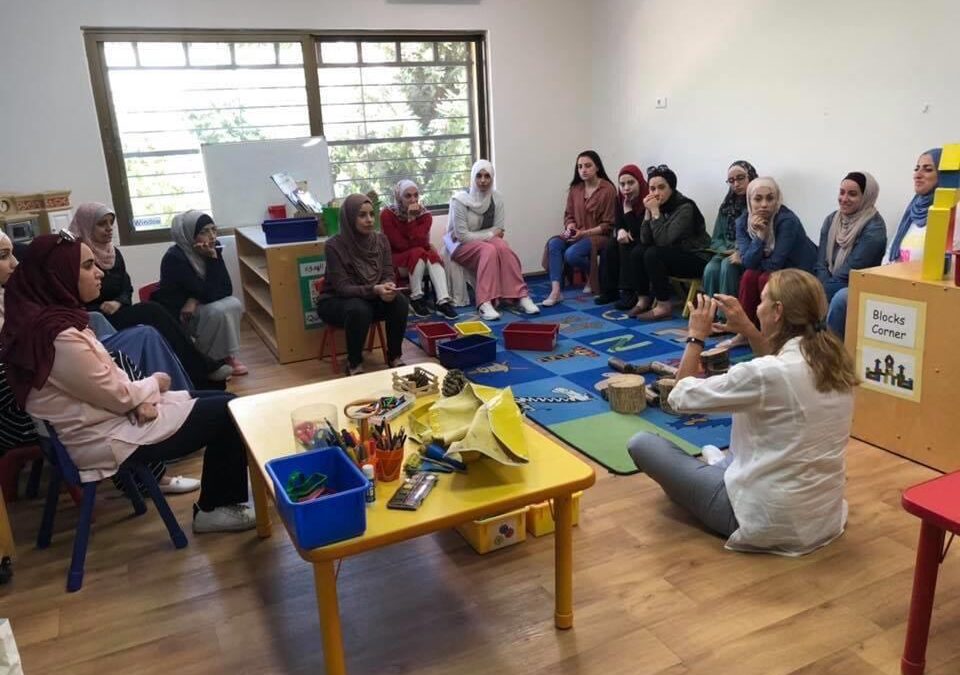
Jul 16, 2020
Women’s rights groups and worker advocates in Jordan are hailing the re-opening of child care centers, a move they say enables women running small day care centers or working in larger nurseries to support themselves, while ensuing safe care for the children of women returning to their jobs after the novel coronavirus closures.
The more than 1,400 day care facilities across the kingdom opened July 4 under strict safety measures to limit the spread of COVID-19, including masks, social distancing and weekly exams for the children.
Since the beginning of the coronavirus crisis, “we called on the government to pay attention to women’s work conditions and labor rights in general, day care workers in particular,” says Randa Naffa, co-founder of SADAQA, an organization founded by working parents to advocate for family-friendly work environments.
As SADAQA campaigned to open day care centers, the organization joined with the Women in Business Arabia Network to create an online platform that shed light on the challenges day care center workers face, and spearheaded a Facebook campaign urging the opening of day care facilities.
“Women’s participation in the labor market is very weak, and the absence of the day care facilities is one of the reasons why women don’t join the labor market or withdraw from it,” says Naffa.
Women Back to Work Without Safe Places for the Children
Day care centers, which serve 50,000 children, remained closed weeks after other private-sector businesses were allowed to open, even though “working women had no choice but to go back to work,” says Tasneem Dudin, owner of a day care facility. Without access to licensed facilities, women were faced with a choice to leave their children alone at home or send them to unregistered nurseries that may not be following safe health practices, she says.
“Day care facilities are usually small projects for women who are struggling and facing the economic and social challenges,” Dudin says. Most facilities do not have bank accounts and typically employ workers day to day. Dudin estimates that some 90 percent of the facilities could not pay rent or workers’ wages after they were closed during the lockdown.
“The owners of these facilities couldn’t pay wages because of the economic crisis and many workers have been laid off and ended up unemployed,” says Mohammad Ersan, the host of Workers of the Country (عمال البلد), a worker-centered radio program launched last year in cooperation with the Solidarity Center. The June show featured Naffa, Dudin and others who discussed the need to open child care facilities.
Saba Yaseen says she cared for her two children, ages 5 and 2, throughout the lockdown as she teleworked from home, and her husband had to take off work to care for them when she had to leave for urgent matters. But once back at work, she would have not choice but to send the children to unregistered facilities if the formal facilities did not open, she said on the radio program.
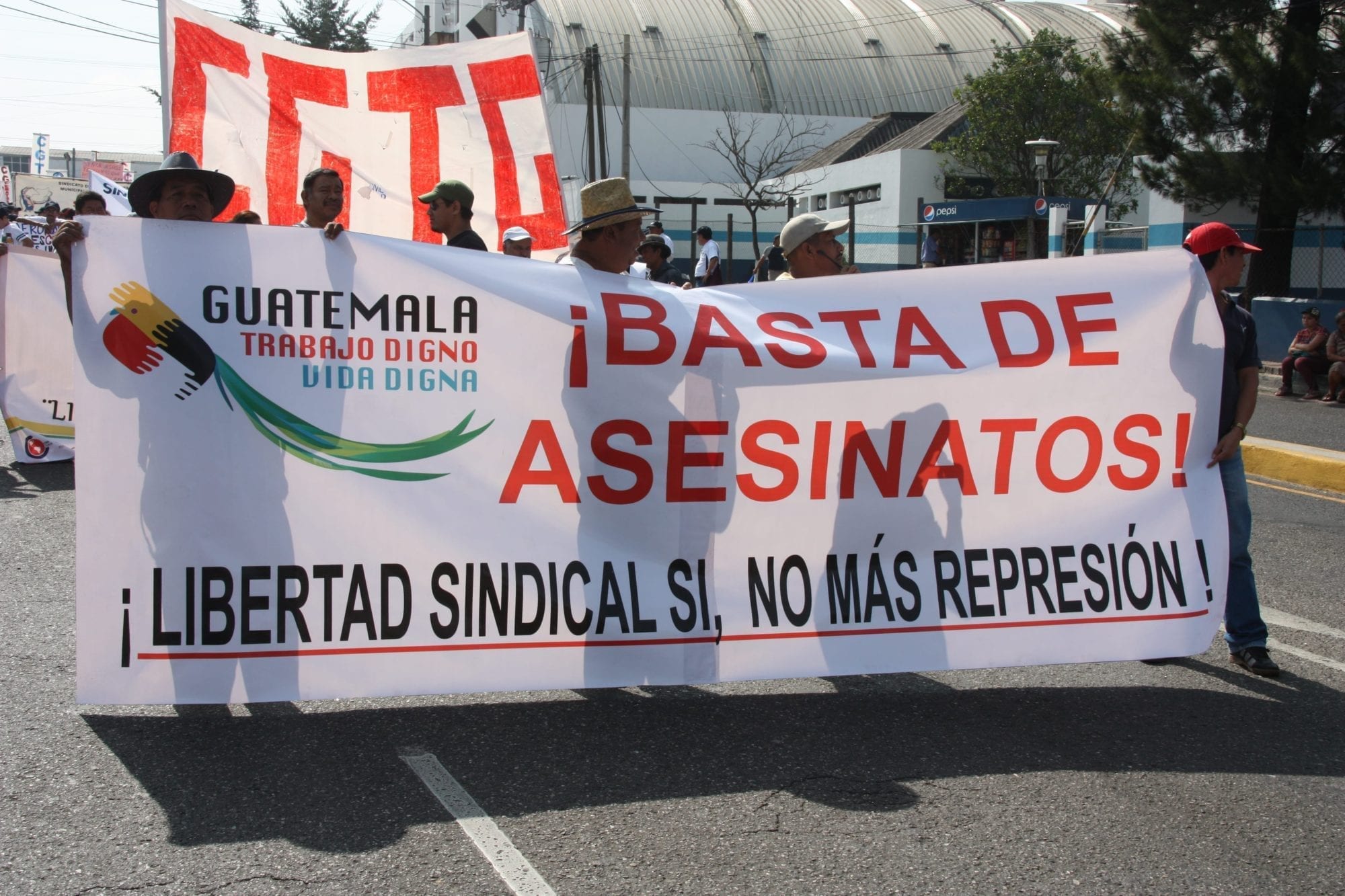
Jun 30, 2020
Threats, including death threats, and intimidation were the most common forms of violence against union activists and workers seeking to form unions in Guatemala last year, according to a new report by the Network of Labor Rights Defenders of Guatemala (REDLG). (Read the full report and the Executive Summary in English.)
Several union activists were targeted with death threats in 2019, including Damaris Jiménez and Edgar Chiguichón, leaders of an organizing committee to form a union at a maquila, according to the 2019 Annual Report on Anti-Union Violence. Union leader Hector Reyes also received a death threat indicating he should resign from his job and end his efforts to form a municipal union in San Diego, a city in Guatemala’s Zacapa Department. Two other maquila union leader also received death threats.
REDLG, a Solidarity Center partner, has documented and verified 26 cases of anti-union over the past year. But these numbers represent severe underreporting. Fewer than half of survivors of anti-union violence in 2019 say they formally denounced the incidents “before a competent authority.”
Among the recorded cases, the most frequent was “criminalization,” or using the criminal justice system “for halting the work of a defender.” In some cases, criminal denunciations against a labor unionist are fabricated to prevent the accused from pursuing union work while challenging the charges, according to the report.
In other cases, the intention is to ensure a labor activist is imprisoned to completely halt the individual’s union activity—“that is, the criminal system or other punitive methods are used to discredit or hinder the defense of rights,” according to the report.
Guatemala: Violence Pervasive and Unpunished
Guatemala is consistently ranked among the countries with the world’s worst worker rights, according to the new International Trade Union Confederation’s 2020 Global Rights Index. “The pervasive climate of repression, physical violence and intimidation against workers and trade unionists” is made worse by the government’s “failure to pursue the many historic cases of murders and other violent crimes,” according to the Global Rights Index. Since 2004, the year the CAFTA-DR free trade agreement was signed, 101 trade unionists have been murdered in Guatemala, according to the International Labor Organization and the REDLG.
The Anti-Union Violence Report, which seeks to show that “anti-union violence is a complex social occurrence in Guatemala, of which we are far from knowing its depth,” points out that domestic violence and other forms of gender-based violence are rarely reported and in fact may sometimes be directed at women for their involvement with unions. “This type of violence can be normalized and go undetected,” according to the report, which points out that vulnerable groups such as members of the LGBTQI+ community, Indigenous people and persons with disabilities also are targets of such unreported anti-union violence.
The report situates the struggles by workers to form unions within the country’s larger economic challenges, including vast poverty affecting those with jobs who do not earn enough to support themselves and their families. Some 70 percent of all workers are in the informal economy, selling food in markets, driving taxis and cleaning homes. Yet for the first time in 10 years, the government last year did not raise the minimum wage in any job sector. The government also issued a decree that sought to create jobs in the formal economy with lower benefits than allowed by law and wages lower than the minimum, a move unions in part successfully countered.
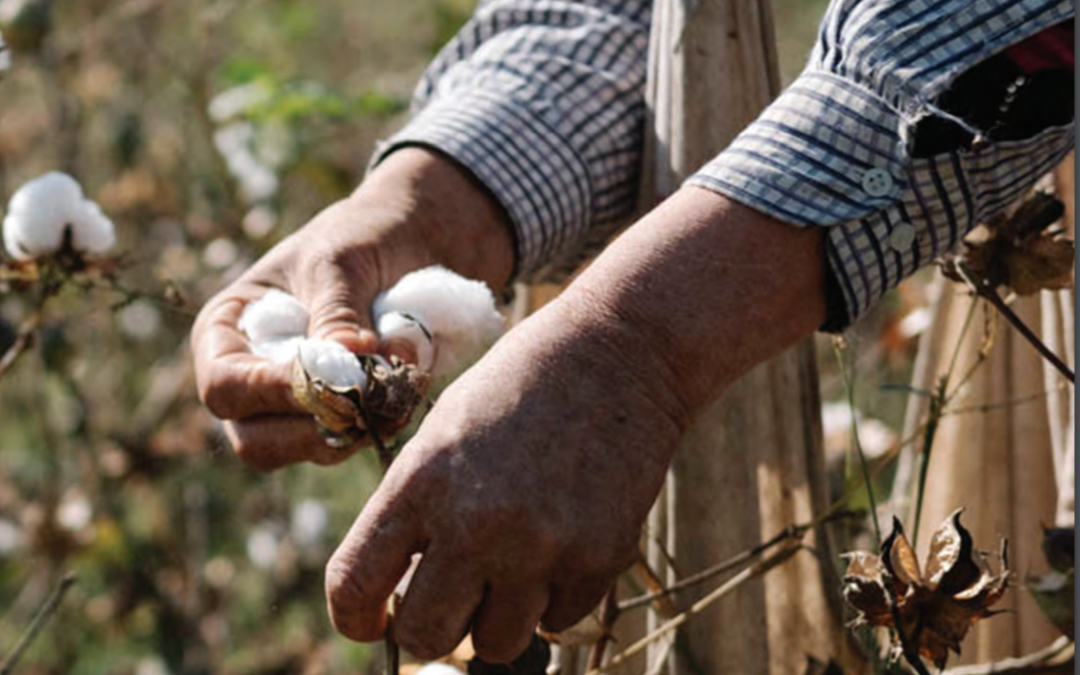
Jun 26, 2020
A new report on Uzbekistan’s 2019 cotton harvest by Uzbek Forum for Human Rights documents progress toward ending—but not eradication—of state-sponsored forced labor, says the Cotton Campaign.
The report, “Tashkent’s Reforms Have Not Yet Reached Us,” finds that a state-imposed cotton quota, labor shortages, lack of fair and independent recruitment channels, and weak accountability systems contribute to the continuation of forced labor in Uzbekistan’s cotton fields—and that broader reform efforts in the country are being limited by slow progress on civil society freedoms.
The report’s findings are based on more than 100 in-depth and hundreds of short interviews with people involved in the cotton harvest, as well as field visits, farm monitoring in six regions, and data and analysis from a nationwide online survey conducted in partnership with the Solidarity Center and public polling/research firm RIWI Corp.
Employees of state and privately owned enterprises in interviews consistently reported being unable to refuse orders to pick cotton by government officials or employers for fear of dismissal or other job-related consequences. About half of online survey respondents said they could not refuse when asked to go to the fields or pay for a replacement picker. This testimony underscores the pressing need to establish effective recruitment systems free from interference or coercion by the government or the authorities, says the Uzbek Forum for Human Rights.
The report also documents that reform of civil society freedoms has lagged far behind the pace of reforms in other key areas, inhibiting the freedom of citizens to form civic associations such as nongovernmental organizations (NGOs) and independent trade unions empowered to fight forced labor in Uzbekistan. The report notes with concern the small number of independent, self-initiated NGOs registered in the country and the high number of rejections for registration.
“Independent NGOs, unions and civic activists have a central role to play in the reform process in promoting transparency and accountability,” says Solidarity Center’s Eastern Europe/Central Asia Director, Rudy Porter. “There is a pressing need to guarantee basic civic freedoms to empower activists to conduct independent monitoring and ensure labor practices are in line with international standards.”
The U.S. State Department’s annual Trafficking in Persons report yesterday specified that Uzbekistan will remain on its Tier 2 watchlist because the country does not yet meet the minimum standards set out in the U.S. Trafficking Victims Protection Act. The report noted that, “During 2019, the government continued to demand farmers and local officials fulfill state-assigned cotton production quotas or face penalties, which caused local officials to compel work in the annual cotton harvest.”
The Cotton Campaign, of which Solidarity Center is a member, is a global coalition of human rights, labor, responsible investor and business organizations dedicated to eradicating child and forced labor in cotton production in Uzbekistan and Turkmenistan. A Cotton Campaign roadmap for the government of Uzbekistan to dismantle the forced labor system of cotton production was presented to government officials during high-level meetings in Tashkent in May 2018.
Photo: Tashkent region, 2019. Credit: Uzbek Forum for Human Rights
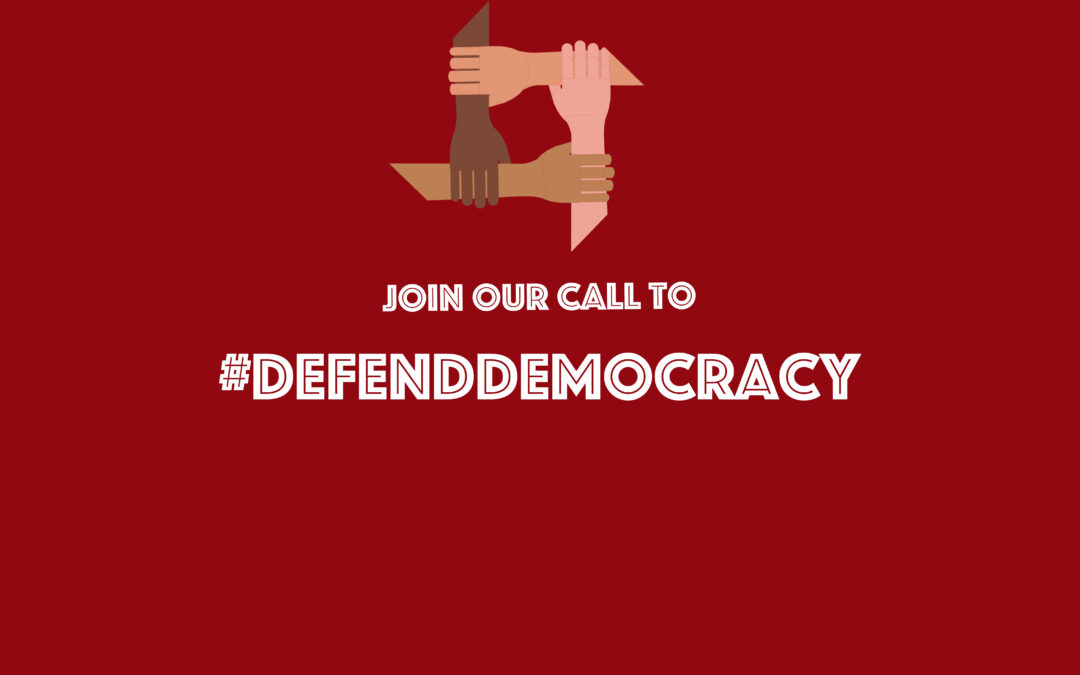
Jun 25, 2020
More than 500 political, civil leaders, Nobel Laureates and pro-democracy institutions—including the Solidarity Center—are calling for the defense of democracy and warning that fundamental freedoms are under threat from governments using the COVID-19 pandemic to tighten their grip on power.
In a letter released today, the signatories from around the world and a broad political spectrum said, “Repression will not help to control the pandemic. Silencing free speech, jailing peaceful dissenters, suppressing legislative oversight and indefinitely canceling elections all do nothing to protect public health. On the contrary, these assaults on freedom, transparency and democracy will make it more difficult for societies to respond quickly and effectively to the crisis through both government and civic action.”
The pandemic and the global movement for racial equality have demonstrated that “democracy is more important than ever,” the group said in a press release. “Democracy allows for civil society to mobilize, for inequalities to be confronted, for policy issues to be openly debated, for trustworthy information to freely flow, and governments to be accountable to citizens—all essential tools for successfully dealing with the current public health emergency and its consequences.”
They added that the key elements of liberal democracy—credible and free flowing information, fact-based debate about policy options, voluntary self-organization of civil society and open engagement between government and society—are vital to combating the pandemic. When voices are suppressed, “the results can be deadly, not for just one country but for the entire world.”
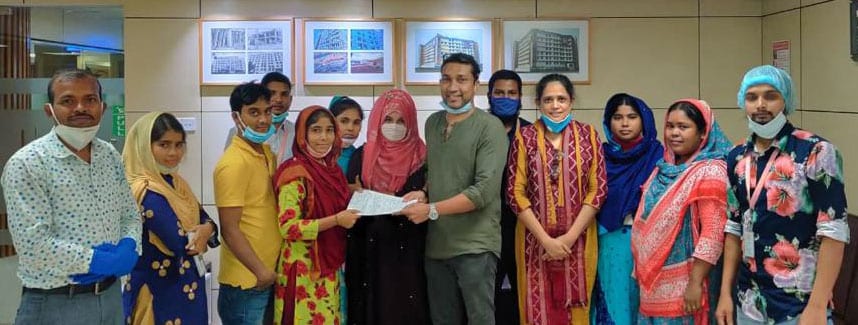
Jun 22, 2020
More than 2,000 garment workers in Bangladesh are celebrating a new collective bargaining agreement that includes a 10 percent pay increase—double the amount required by law—and creation of a committee to prevent violence and harassment on the job. The pact, negotiated by the Hop Lun Apparels Ltd. Sommilito Sramik Union (HLALSSU), is retroactive to January.
The new agreement comes as many garment workers in Bangladesh and around the world are being laid off without pay because major fashion brands are canceling orders due to lack of demand during the novel coronavirus pandemic.
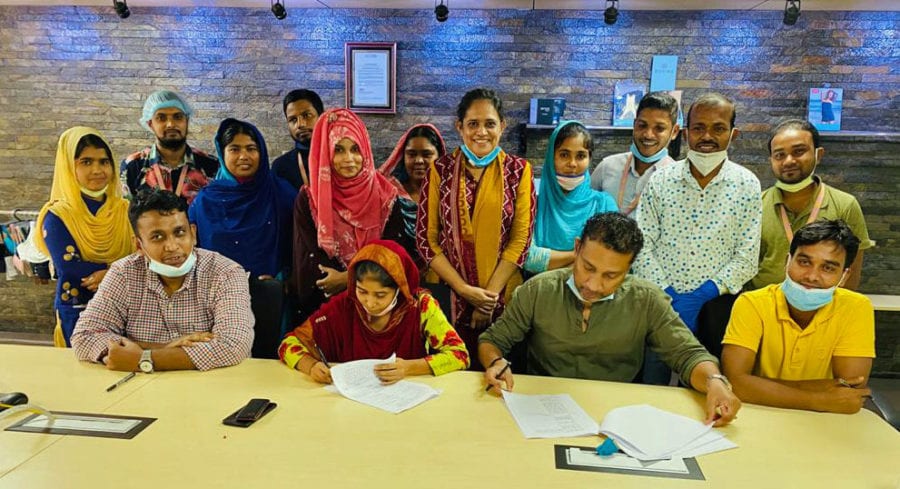
2,000+ Bangladesh garment workers have new contract that includes a 10 percent wage increase and a day care facility for their children. Credit: SGSF
“The guarantee of promotions for women to the higher posts and the establishment of the sexual harassment committee will empower the women and provide safeguards against sexual abuse and harassment in our factory,” says Aklima HLALSSU president.
Under the new contract, Hop Lun will set up a day care facility for workers’ children younger than age six, who will be guaranteed quality care and education. Factory management will provide free ultrasound tests for all pregnant workers, subsided food in the factory canteen, and guarantee a minimum of 20 women workers will be promoted annually.
Under Bangladesh law, women workers are entitled to 16 weeks’ maternity leave, yet employers often do not grant garment workers the required leave. The new contract provides enforcement of the law.
“It is because we have a strong union that we could maintain a good relation with the factory management and sign this collective bargaining agreement,” says Sommilito Garments Sramik Federation (SGSF) General Secretary Nahidul Hasan Nayan. “That is why, during this COVID-19 crisis, Hop Lun factory maintained the highest standard of safety for its workers and has provided each and every employee with proper protective equipment.”
The contract also includes provisions to streamline union representation, with the employer providing space for a union office and automatically deducting union dues. Union leaders will be involved in trainings and workshops and joint meetings with management.






